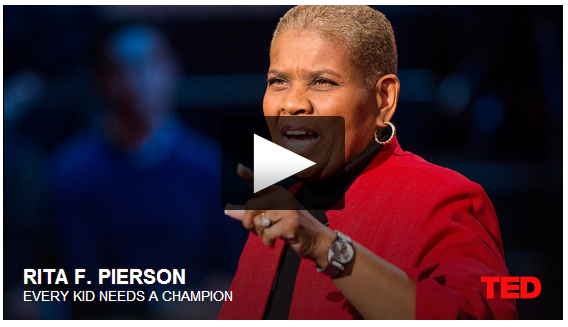

Unfortunately and increasingly, the quote I see and hear pulled from Dr. With few caveats, I agree with this statement and the overall sentiment of the Ted Talk. “Every child deserves a champion, an adult who will never give up on them, who understands the power of connection, and insists that they become the best that they can possibly be.” I believe this quote best summarizes her talk: You can see it and feel it in the way she delivers her talk she’s got it. I have no doubt she was an incredible educator and mentor to students and teachers. Rita Pierson says many great things about relationships and education. Let them take ownership for the change and they will drive it forward.In a quite popular Ted Talk, Every Kid Needs A Champion, Dr. Reflect with them about what is going well. It’s amazing how positivity can snowball. The more they hear it from other people, the more they will believe it. Get others, especially those who have had negative relationships with them in the past, to join the bandwagon of praise. Take the time to work with them and avoid making the changes for them. If they don’t want it, it will ultimately fall apart. They are the ones making them, with you support, and not because you are making them change. They need to take ownership of the positive changes. If they say it enough, it will become part of them! 7. Break the negative self-fulfilling prophecy and get them to recognise (and verbalise) their positives. You may believe in them but do they believe in themselves? It’s hard at any age but especially when they may be aware of others perceptions of them. Yes it is time-consuming but it will be worth every second in the long run. Short check-ins let them know you’re still there. Then, when they avoid the situation in the future or show the change, make sure you highlight it. Avoid the temptation to focus too much on the negative – try to flip it on its head. What went wrong? Why? What can we do to make sure it doesn’t happen again? What have we learnt? Support them with this. Make sure you turn these moments into learning opportunities. Where possible, fight their corner! The more staff hear you championing the child, the less likely they are to miss out due to the past or the perceptions of others. It is amazing how many children miss out because staff find it easier to not include them.

Fight their corner outside of the classroom Make sure you spread the word – let everyone know their successes! 3. It’s amazing how our impressions of a child are formed before we have even welcomed them into our classroom. Listen to but don’t take as verbatim another adult’s perceptions of a child they have taught or interacted with. As James Comer said, “No significant learning can come without a significant relationship”. You need to truly get to know them before you can champion them. However, they can never know this! Make sure you spend time making human connections with those children you wouldn’t naturally make. Let’s be honest, no one expects you to like every child in your class equally. So, what can we do to ensure that everyone has somebody in their corner, especially those who we find it the hardest to champion? 1. Top 10 Tips for Being A Champion For Your Children It’s obvious that as we form relationships, those that make positive impacts on us becomes one of our favourite, we form connections, and we become their champion. We do it without even realising it’s happening… The Usual SuspectsĮvery teacher, whether a wide-eyed trainee or thick-skinned veteran, has favourites in their class. In fact, it was only on reflection – after hearing a keynote this year – that I became fully conscious of just how easy it is to do. Now before I begin, this isn’t a rant or finger-pointing.

“Every child deserves a champion – an adult who will never give up on them, who understands the power of connections and insists that they become the best that they can possibly be.” Additionally, he has held trust-wide leadership responsibilities including NQT/RQT Programme Coordinator, ITT Coordinator, Writing Moderator and.ĭoes every child need someone to fight their corner? Lee HillSince switching from psychology to primary education in 2011, Lee has held numerous teaching and leadership roles: KS2 class teacher, Phase Leader, Literacy Coordinator, Assistant Headteacher and Vice Principal.


 0 kommentar(er)
0 kommentar(er)
